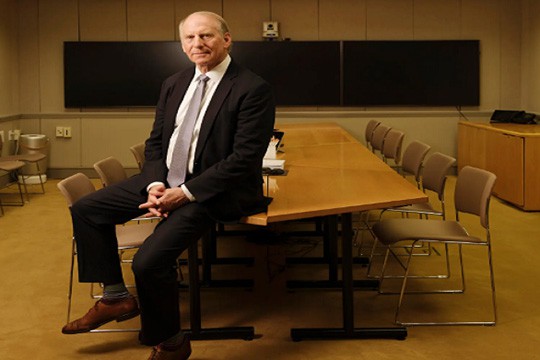Mr. Haass is a veteran of four US administrations, one Democrat and three Republican.
Photo: The New York Times
The New York Times published a very revealing material about the views of a well-known US political analyst, who has now come to a very sad conclusion for Americans:
Everywhere he has gone as president of the Council on Foreign Relations, Richard N. Haass has been asked the same question: What keeps him up at night? He has had no shortage of options over the years — Russia, China, Iran, North Korea, climate change, international terrorism, food insecurity, the global pandemic.
But as he steps down after two decades running America’s most storied private organization focused on international affairs, Mr. Haass has come to a disturbing conclusion.
The most serious danger to the security of the world right now? The threat that costs him sleep? The United States itself. – “It’s us,” he said ruefully the other day.
That was never a thought this global strategist would have entertained until recently. But in his mind, the unraveling of the American political system means that for the first time in his life the internal threat has surpassed the external threat. Instead of being the most reliable anchor in a volatile world, Mr. Haass said, the United States has become the most profound source of instability and an uncertain exemplar of democracy.
“Our domestic political situation is not only one that others don’t want to emulate,” he said in an interview ahead of his last day at the Council on Foreign Relations on Friday. “But I also think that it’s introduced a degree of unpredictability and a lack of reliability that’s really poisonous. For America’s ability to function successfully in the world, I mean, it makes it very hard for our friends to depend on us.”
The challenges at home have prompted a man who has spent his entire career as a policymaker and student of world affairs to turn his attention inward. Mr. Haass recently published a book called “The Bill of Obligations: The Ten Habits of Good Citizens,” outlining ways Americans can help heal their own society.
“My own trajectory has changed,” he observed during a pair of interviews summing up two decades at the council. “This new book is not something I would have predicted writing five or 10 years ago, but I actually think it’s almost a recasting of American democracy. Now it’s become a national security concern. And that’s different.”
By dint of position as well as temperament, Mr. Haass, 71, is a member in good standing of the establishment that has fallen into disfavor in the era of Donald J. Trump, a voice of the largely bipartisan “realist” consensus that for better or worse defined America’s place in the world for most of the three-quarters of a century since World War II.
A veteran of four administrations, one Democrat and three Republican, Mr. Haass has nonetheless transcended the insular world of think tank policy wonks through regular appearances on MSNBC’s “Morning Joe,” where in measured but unmistakable terms he has lamented the political polarization and excesses of recent years and tried to make sense of it all.
Over the past century, America has experienced other periods of division and discord — Jim Crow, McCarthyism, Vietnam, civil rights, Watergate. The assassinations and riots and war of 1968 often come to mind as a singularly miserable year in the life of the nation. But Mr. Haass sees this moment as even worse. “These were not threats to the system, the fabric,” he said. “That’s why I think this is more significant.”
After exploring other countries for most of the past half-century, Mr. Haass is ready to explore his own. Putting his foreign policy hat aside for now, he said he wants to expand the message from his book and help refocus the country on the core values embodied in the Declaration of Independence as the 250th anniversary of the document approaches three years from now.
read more in our Telegram-channel https://t.me/The_International_Affairs

 10:57 10.07.2023 •
10:57 10.07.2023 •























